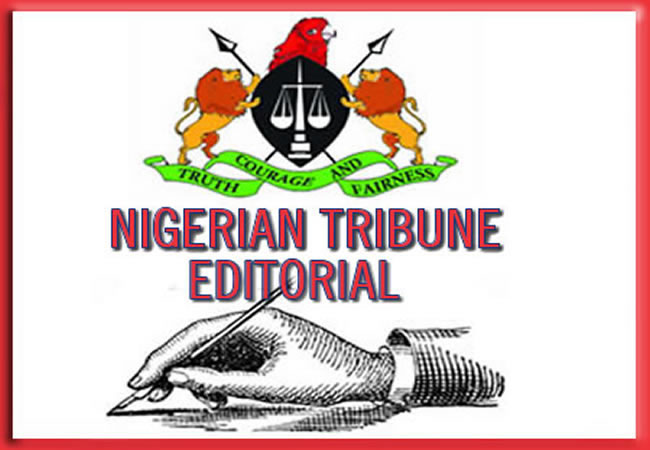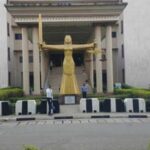ON Wednesday, May 3, the first batch of Nigerians fleeing from the armed conflict between rival factions of the military government of Sudan arrived at the Abuja airport. They are a part of the over 100,000 persons who had fled the country since clashes broke out in the country in the capital city of Khartoum and in the Darfur region on April 15. It started when the Rapid Support Forces (RSF) launched a surprise attack on multiple Sudanese Army bases and key government sites. With the response of the Sudanese Armed Forces (SAF), airstrikes, artillery and gunfire were reported across Sudan. The conflict, as of April 25, had witnessed the death of at least 559 people and more than 4,000 others had been injured. The UN projected that the total number of refugees fleeing Sudan could reach more than 800,000 people while noting that the conflict had produced around 334,000 internally displaced persons by May 2.
This latest and ongoing crisis in Sudan had been long in coming. In December 2018, citizens of the country protested Omar al-Bashir’s nearly 30-year rule for eight months despite violent repression by the government. The protests were galvanised by the Sudanese Professionals Association and the Forces of Freedom and Change. Then in April 2019, the military led by Abdel Fattah al-Burhan, in connivance with the RSF led by Mohamed Hamdan Degalo (Hemedti), ended al-Bashir’s three-decade rule. The military junta established a Transitional Military Council to run the affairs of the country. Omar al-Bashir was imprisoned in Khartoum rather than turned over to the ICC, which had issued warrants of arrest on hin on charges of war crimes.
The protests did not abate; the protesters called for civilian rule. In June 2019, the RSF attacked protesters in Khartoum with more than a hundred demonstrators killed and dozens raped. The stand-off was only resolved in August 2019 through international pressure and mediation by the African Union and Ethiopia. Under the circumstance, the military agreed to share power in an interim joint civilian-military unity government called the Transitional Sovereignty Council, headed by a civilian Prime Minister, Abdalla Hamdok. Elections were scheduled to take place in 2023. However, the SAF and RSF seized power again in October 2021 and reconstituted the Transitional Sovereignty Council with Generals Burhan and Dagalo emerging as chairman and deputy chairman. But General al-Burhan monopolised power. The coup effectively halted the transition programme that would have returned the country to democratic rule.
In February 2023, tensions between the RSF and the SAF began to escalate, reflecting the differences between al-Burhan and Degalo over the modality of integration of the RSF into the military, the status given to RSF officers in the future hierarchy, and whether RSF forces should come under the command of the army chief rather than Sudan’s Commander-in- Chief, al-Burhan, and over sectors of Sudan’s economy that are controlled by the two factions. As it turned out, Dagalo expressed regret over the October 2021 coup and the RSF began recruiting members from across Sudan, resulting in a brief military build-up in Khartoum. An agreement for de-escalation and handing over of authority to a civilian-led government was followed by the RSF’s withdrawal of troops. But it did not resolve tensions between Generals Burhan and Dagalo. On April 11, RSF forces deployed near the city of Merowe and in Khartoum. Government forces ordered them to leave, but they refused. The RSF forces took control of the Soba military base south of Khartoum on April 13 and began mobilisation. The SAF declared the mobilisation illegal.
Fighting began with attacks by the RSF on key government sites. Airstrikes, artillery and gunfire were reported across Sudan, including in Khartoum. As of April 23, both the RSF leader and Sudan’s de facto leader and army chief claimed control of several key government sites, including the general military headquarters, the Presidential Palace, Khartoum International Airport, Burhan’s official residence, and the Sudanese National Broadcasting Corporation headquarters. The conflict between the two Generals has rendered the country ungovernable, imposing unimaginable pains and misery on the people. Apart from the enormous cost in the lives of those directly killed in the confrontations, social life has been disrupted with many citizens holed up in their homes without access to food. Many countries, including the United States, Britain, France and others have been evacuating their citizens, even as the Nigerian government has made faltering steps to evacuate Nigerians. We call on the government to ensure the full evacuation of Nigerians in this regard.
Nonetheless, the international community should not just be concerned with the evacuation of foreign nationals, leaving the Sudanese to suffer the ugly consequences of the emerging civil war. The aim of the international community should be to return peace to the land by prevailing on the military factions to dialogue over the disagreements that have resulted in the current crisis. We call on the leadership of the African Union and the neighbours of Sudan to rise to the challenge of restoring peace to the country. Having endured more than 15 military coups, prolonged military rule and repressive governance since independence in 1956, innocent Sudanese caught up in the violence need respite. All countries with influence should step in with the sole objective of putting a stop to the continuing violence to ensure that peace and normalcy are restored forthwith. A realistic programme of transition to democratic rule based on dialogue with stakeholders should be the goal of international intervention to resolve the crisis.






